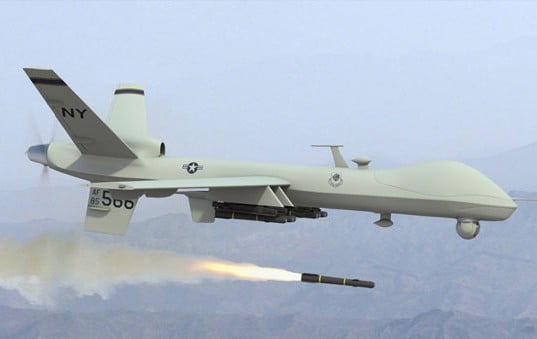
Up until recently, the debate over drone policy has largely been the territory of a small group of vocal critics — a persistent if not particularly high-profile media issue, but not one that particularly troubled the U.S. public. Polls indicated broad popular support for the use of drone strikes abroad, mainly out of a belief that they were the best way to prevent terrorism without endangering American lives. In February 2012, a Washington Post-ABC News opinion poll found that 83 percent of Americans supported President Obama’s use of unmanned drone aircraft against terrorist suspects overseas. Of those 83 percent, 79 percent also approved the use of drone strikes against American citizens living in other countries who were suspected of terrorism. The responses were more ambivalent when the idea of civilian casualties was introduced, but the Obama administration has been quite adept at insisting that these are exceptionally rare, despite evidence to the contrary.
That was before the question of drone use within the borders of the United States began to sneak into the equation, buoyed in part by suggestions — both genuine and to make a point — that drones might be used in the manhunt for triple murder suspect (and retired marine) Christopher Dorner. This kicked off a firestorm of media coverage and largely took over the drone policy debate. Seeking answers to whether or not the Obama Administration thought it was entitled to launch drone strike within the United States, Rand Paul (R-KY) filibustered for 12 hours at the 6 March Senate confirmation hearing of Obama’s CIA Director nominee, John Brennan, a leading architect of drone policy in the Obama White House.
The formerly niche issue has taken center stage, with pundits and politicians questioning whether drone strikes should be used in the United States under certain circumstances, and indeed whether or not that would be legal. Obama administration officials have fueled the fire by answering questions opaquely and refusing to categorically rule out their right to exercise the option. Even Attorney General Eric Holder’s latest clarification leaves the door open under some circumstances.
The Administration’s refusal to take this option off the table is very worrying, but for now at least, the prospect of the U.S. deteriorating into a dystopian hellscape where justice is meted out through extrajudicial drone strikes on American soil is a less immediate concern than the continued immoral and counterproductive use of drone strikes in Pakistan, Yemen, and Somalia.
Although the U.S. may be getting better at minimizing “collateral damage,” as long as strikes continue, civilian casualties will be all but inevitable. Any civilian casualties should be considered morally unacceptable, but the continued use of the drone program is also unwise from a more pragmatic perspective. There are many indirect consequences of the drone campaign. As documented in the recent Stanford/NYU study, Living Under Drones, the specter of drone strikes inflicts great emotional trauma on the targeted areas, causing widespread fear, and undermining community institutions. That’s to say nothing of the damage drone strikes do to America’s reputation abroad, where they are universally unpopular, disliked particularly in the Muslim world, and reviled in places like Pakistan which bear the brunt of their impact. It is impossible to determine exactly how much this antipathy translates into the radicalization of new extremists, but the issue should be taken seriously. It certainly deserves a more robust examination than the blanket dismissal typically provided by White House spokespeople.
Perhaps the emergence of the domestic question is a positive development for the wider drone debate. Foreign drone strikes have been more visible in the news, either tangentially or more directly as a corollary to the issue of activity on U.S. soil. But there is a danger that they will become a fringe issue as the debate continues to turn toward the question of whether or not drones should be used to strike foreign or domestic terror suspects within U.S. borders, or indeed whether or not unmanned aerial vehicles can play a more benign role in American skies. (The appearance of articles defending drones for things like counting sealions (disclaimer: I am totally fine with this, count away!) clearly signals a new phase of the debate.) Theoretical questions about drone use have always been a distraction from the key question of how they are actually used in practice, but now drone usage abroad — already a rare subject of bipartisan agreement inside the beltway — is at risk of becoming a marginal aspect of the debate.